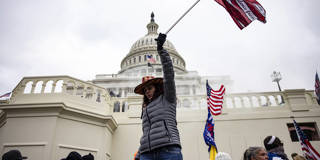History shows that democratic self-governance depends on civic friendship, whereby everyone accepts that their political opponents are worthy of respect, even if they seem deeply misguided or misinformed. Unfortunately for America today, all it takes to break this compact is for one "side" to walk away.
BERKELEY – Allow me to offer high praise for The Civic Bargain: How Democracy Survives, the new book by the independent scholar Brook Manville and Josiah Ober of Stanford University’s Hoover Institution. While the entire book is well-written and insightful, its historical overview is a veritable treasure trove for anyone who wants to understand the events leading up to our experiment in self-government, the challenges encountered along the way (human nature being what it is), and the patterns that are most likely to be repeated in the future.
But then comes the question of what we should do now. This part of the book left me depressed and empty, with nothing constructive to say, because I agree with the authors’ big conclusion that democracies survive only when they are underpinned by civic friendship between their members.
Looking back to the Roman Republic before 150 BC, Plutarch observed that points of contention “though neither trifling nor raised for trifling objects, were settled by mutual concessions, the nobles yielding from fear of the multitude, and the people out of respect for the senate.” If only such a description applied to the United States today. Instead, one of our two main political parties, the Republican Party, has become so constituted that acknowledging the other party as a civic friend would be tantamount to its own ideological bankruptcy. To regard Democrats as anything other than alien mortal enemies is to hand in one’s GOP card – and for many party professionals, one’s livelihood. It simply cannot be done.

BERKELEY – Allow me to offer high praise for The Civic Bargain: How Democracy Survives, the new book by the independent scholar Brook Manville and Josiah Ober of Stanford University’s Hoover Institution. While the entire book is well-written and insightful, its historical overview is a veritable treasure trove for anyone who wants to understand the events leading up to our experiment in self-government, the challenges encountered along the way (human nature being what it is), and the patterns that are most likely to be repeated in the future.
But then comes the question of what we should do now. This part of the book left me depressed and empty, with nothing constructive to say, because I agree with the authors’ big conclusion that democracies survive only when they are underpinned by civic friendship between their members.
Looking back to the Roman Republic before 150 BC, Plutarch observed that points of contention “though neither trifling nor raised for trifling objects, were settled by mutual concessions, the nobles yielding from fear of the multitude, and the people out of respect for the senate.” If only such a description applied to the United States today. Instead, one of our two main political parties, the Republican Party, has become so constituted that acknowledging the other party as a civic friend would be tantamount to its own ideological bankruptcy. To regard Democrats as anything other than alien mortal enemies is to hand in one’s GOP card – and for many party professionals, one’s livelihood. It simply cannot be done.